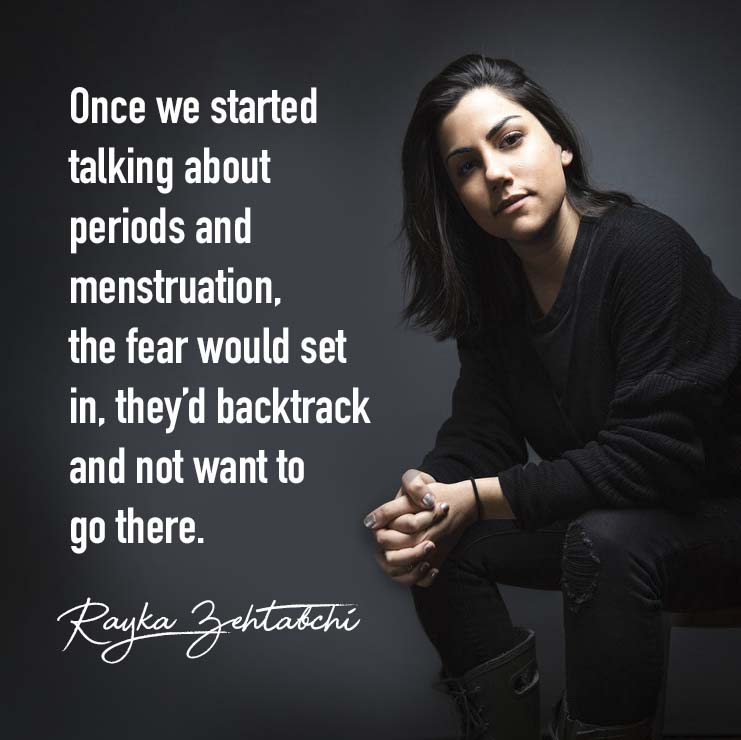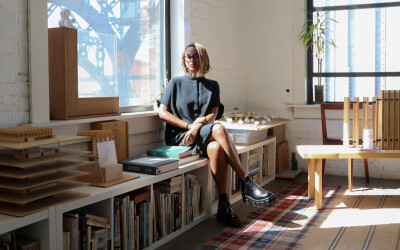Meet Rayka Zehtabchi
There are things we take for granted in our world and cities. Access to clean water and access to good sanitation. As women, we complain about our periods, but if we’re lucky we have access to everything we could possibly want.
In many parts of the world, including right here in America, many women don’t have access to sanitary pads, Stigma is placed on women and menstruation and young girls who get their period because they don’t have access to feminine hygiene.
Period. End Of Sentence. is an Oscar-nominated short from director Rayka Zehtabchi. She takes us into a rural village outside of Delhi where women are quietly leading a revolution against this stigma. There’s a clip in the short where the men are asked if they know what a period is, and they don’t know the answer.
Period. End Of Sentence. shines a light on the women who have learned to manufacture their own pads and in turn empower them and other women in their community. I caught up with director Rayka Zehtabchi and producer Melissa Berton to talk about this journey and how this little engine that could, Period. End Of Sentence. is helping raise awareness.
Q: Rayka, you packed your bags and you flew to India. What was your first reaction when you’re out there in the village to see that first hand? We just take so much for granted and there you are seeing these women.
A: Before going to the village, I was so taken aback when I learned about this issue because I had never thought about it before. I never thought it was an issue that women were dealing with around the world and also right here in the USA. When we arrived in the village, the first time we arrived, it was around the time the pad machine was being installed. I was so completely astonished. You hear these things in news reports but it’s a very different experience when you’re talking to the women who experience it first hand. It’s astonishing and heartbreaking to know there are women out there who are 50 and had been going through menstruation their entire lives and didn’t know why they were menstruating and were being told by village elders and other people that there was something wrong with them and that they had an illness. What broke my heart was that these women were so strong and so incredible that once we started talking about periods and menstruation, the fear would set in, they’d backtrack and not want to go there. They’d try to change the subject. As a woman myself, it really was heartbreaking to see that something that is so natural and so beautiful and something that gives women strength can actually be a source of fear and shame and is really the reason they’re being shamed and sequestered.
Q: Was that easy to shoot in the village or did you have to do a covert operation to get them to open up?
A: It was incredibly challenging as you can imagine. Logistically going into villages in enough itself is a problem. These places are really rural and a lot of these people don’t often have outsiders coming in. Firstly, very obviously we are foreigners. We’re coming into their village with a camera crew. We’d try our best to strip the crew down and have a very small skeleton crew with limited gear. The bottom line was you had a camera in someone’s face and you’re entering a stranger’s home. You’re talking about something that they’ve gone their entire lives avoiding. A lot of the beginning of the film that you see is what we had captured on our first trip days before the machine was installed. You really get a sense for how uncomfortable these subjects were and how reluctant they were to share any experiences or inside information about their periods and how other people perceive periods. It was challenging, but as a filmmaker, you’re there to capture the truth. We embrace that. We were very respectful of our subjects and we tried to have lots of conversations before the camera rolled trying to get to know our subjects personally, but also to connect with them as another young woman would. I think that helped over time as they realized what we were doing would be beneficial not only to them but also to the women in their lives. I think over time once the pad machine was installed, I think it helped chip away at some of that shame and taboo. When we returned to India, it was six months after, the machine was fully operating, the women were making pads and the women were learning how to package them so they could distribute them. It was absolutely remarkable what we witnessed when we went back, there was a complete shift in the women’s behavior towards menstruation. I think overall, there was a feeling of confidence and ‘I can do this. I own a business. I am capable of bringing money into my own family home. I don’t need to ask permission for the things I want to achieve in my life.’
Sources awardsdaily.com



